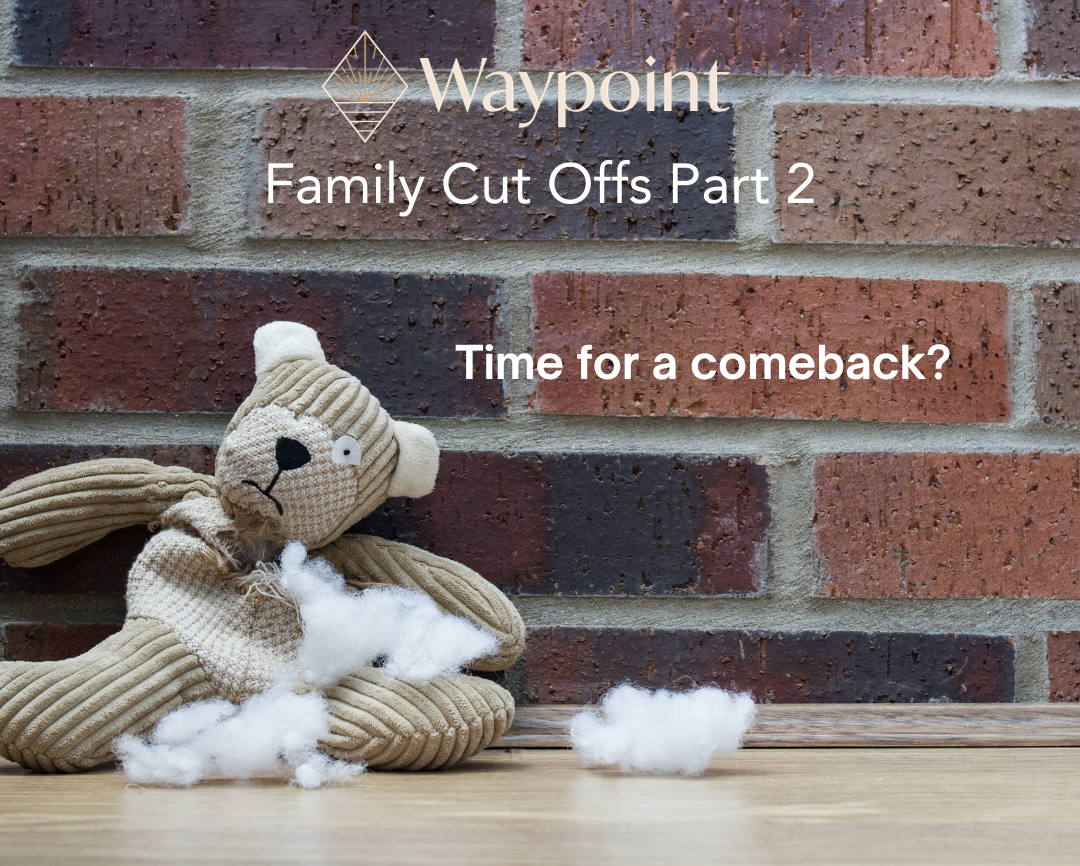
Reclaiming Family Bonds: Overcoming Narcissistic Smear Campaigns and Family Cut-Offs, Part (2)
Dealing with the devastating effects of a narcissist’s manipulation can lead to being cut out of your own family, including your children’s and grandchildren’s lives, which is a heart-wrenching experience. In this blog post, we’ll discuss the painful reality of such situations and provide guidance on reclaiming your family bonds, identity, and decision-making power.
Understanding Narcissism and Its Impact on Familial Relationships
Before delving into solutions, it’s essential to understand the dynamics of narcissism, smear campaigns, and their impact on the targeted person. When we refer to the “targeted person,” we mean the one being victimized by the narcissist. While we at Waypoint work with our clients to overcome a “victim mindset,” we acknowledge that victimization is real and ongoing.
Our Goal: Helping You Distinguish Abusive Behavior from Self-Worth
Abused individuals often struggle to think clearly due to gaslighting, manipulation, and degradation. The duration of the abuse often determines how quickly their deeply held beliefs about themselves can adjust to reality. Our professional work involves challenging these mistaken beliefs, often reinforced by the narcissist, and helping clients see the truth.
Narcissistic Personality Disorder and Its Consequences
Narcissistic Personality Disorder (NPD) involves an inflated sense of self-importance and a relentless need for admiration, leading to manipulation and exploitation of others. Narcissists are extremely self-serving and use others to prop themselves up. Their dangerous behavior stems from their insatiable need for control, validation, and superiority, which they pursue at all costs (Campbell & Miller, 2011).
Narcissists create illusions to garner validation, attention, and favorable public opinion. They spend their lives seeking mirrors that reflect back what they wish were real. This constant play-acting leads to a hollow existence, devoid of authentic connections and true self-awareness (Malkin, 2015).
The Narcissist’s Lack of Genuine Sadness
One might assume that narcissists feel deep sadness about their behavior, but this is not the case. Narcissists believe their own delusions of grandeur, feeling entitled and special. They exploit empathetic and loving individuals as stepping stones to their own ends, discarding them when they no longer serve their purpose (Vaknin, 2007).
Smear Campaigns and Family Cutoffs
Smear campaigns are malicious tactics used by narcissists to destroy relationships and isolate their targets. These campaigns involve telling truths, half-truths, or lies to paint the target in a negative light while elevating themselves. The narcissist’s goal is to create division and discord, often resulting in the target losing relationships with loved ones (Brown, 2009).
A True Example: James’s Story
James, a client, experienced a painful divorce during which his narcissistic sister seized the opportunity to wreak havoc. She shared private details about James’s life with his ex-wife, aiming to inflict maximum damage. This behavior highlights the narcissist’s drive to interfere in others’ lives for personal gain.
The Narcissist’s Motive: Elevating Themselves at Your Expense
Narcissists engage in smear campaigns to dehumanize their targets and create allegiances that uphold their elevated status. They use gaslighting, character assassination, and isolation to achieve their goals. Recognizing these tactics is the first step toward reclaiming your life (Simon, 2010).
Reclaiming Your Family Bonds and Healing
Reclaiming your family bonds and healing from a narcissistic smear campaign is challenging but possible. Here are key steps:
- Self-Awareness: Recognize the situation and understand that you’re not alone. Many have faced similar challenges and emerged stronger.
- Professional Guidance: Seek help from a certified and experienced coach or other trusted professionals who understand the dynamics of narcissistic abuse.
- Establish Boundaries: Create distance between yourself and the narcissist, setting clear boundaries to protect your emotional well-being.
- Build a Support Network: Connect with friends, family members, or support groups who haven’t been influenced by the narcissist. Surround yourself with positive influences.
- Self-Care: Prioritize activities that nurture your physical, emotional, and spiritual well-being.
- Reclaim Your Decision-Making Power: Reconnect with your inner strength and intuition, regain confidence in your decision-making abilities, and reconnect with estranged family members when it’s safe.
Maintaining Mental Health While Loved Ones Are Influenced by the Narcissist
It is crucial to maintain your mental health while your loved one is under the influence of a narcissist. Here are some strategies:
- Stay Grounded: Practice mindfulness, prayerfulness, and grounding techniques to keep yourself centered and resilient.
- Educate Yourself: Understand narcissistic behaviors and tactics so you can better navigate interactions and protect your mental health.
- Limit Contact: If possible, limit interactions with the narcissist to reduce their impact on your well-being.
- Therapeutic Support: Engage in coaching/counseling to process your emotions and develop coping strategies.
- Focus on Self-Improvement: Channel your energy into personal growth and activities that bring you joy and fulfillment.
Encouraging a Loved One Influenced by the Narcissist to Reconnect
When trying to bring a loved one back into your life after they’ve been influenced by a narcissist, patience and understanding are key:
- Open Communication: Maintain open, non-judgmental communication lines with your loved one. Let them know you’re there for them.
- Express Empathy: Show empathy and understanding for their situation, acknowledging the difficulty of their circumstances.
- Provide Information: Gently share information about narcissism and its effects when appropriate. This can help them recognize the manipulation they’re experiencing.
- Be Patient: Understand that it may take time for them to see the truth and feel ready to reconnect.
- Create a Safe Space: Ensure they know they have a safe and supportive environment to return to when they’re ready.
Prepare for Their Return
Recognize that the narcissist will inevitably hurt your loved one as well. When this happens, be ready to support them:
- Stay Available: Be there for them when they reach out, offering a non-judgmental and supportive presence.
- Encourage Healing: Support their healing process by encouraging them to seek professional help and engage in self-care.
- Rebuild Trust: Work on rebuilding trust and strengthening your relationship through consistent, loving actions.
Recognizing How to Get Unstuck Begins with You
To change your life despite the narcissist’s tactics, you need to commit to moving forward. You must want to change, be dissatisfied with your current situation, and be ready to commit to the process.
Comparing Similarities and Differences with a Narcissist
Both you and the narcissist hold distorted beliefs. Recognizing these distortions is crucial for your recovery:
- Mistaken Beliefs: You might not see your inherent value, while the narcissist believes they are superior.
- Opinions of Others: You might value others’ opinions too much, while the narcissist tries to control these opinions.
- Roles & Responsibilities: You may take on undue responsibility for others’ behavior, while the narcissist blames everyone else for their actions.
Taking Control of Your Life
By understanding these dynamics, you can start to change your deeply held beliefs and reclaim your life. Building a new, fulfilling life requires letting go of the opinions of others and creating healthy boundaries. Over time, you will develop a strong radar for narcissists and protect yourself from further harm.
Surviving a Narcissist’s Smear Campaign
Surviving a narcissist smear campaign and being cut off from your loved one is undeniably painful, but healing and reconnection are possible. During this period of separation, it is crucial to focus on your own healing and growth. By reclaiming your identity and decision-making power, you can overcome the manipulation and rebuild your life. Remember, you are not defined by false narratives, and your worth is not determined by others’ opinions.
As you stay resilient and work on yourself, you will rebuild your life, and the connections with those you have lost stand a better chance of reconciliation. Understand that your loved one has also suffered from narcissistic abuse. By growing into a belief that you have worth and value despite the current circumstances, you will be better equipped to help your loved one heal and grow when they return.
Your journey of self-improvement is essential not only for your own well-being but also for fostering a healthier and more supportive environment when your loved one is ready to reconnect. If you or someone you know is facing this situation, know that support is available, and there is hope for a brighter future.
- To reach out to George or Lesley for coaching support head over to the contact page. Click Here
For further reading for those wondering about when it may be appropriate to think about cutting off a family member check out, “Cutting Unhealthy Ties: Recognizing, Letting Go and Healing.” Part 3 Click Here
- Check out, “Building a Supportive Circle.” Click Here
- Check out, “Navigating Grief: The Pain of Estrangement from an Adult Child.” Click here
- Check out, “Navigating the Heartache of Family Estrangement.” Click Here
- Check out, “Navigating the Pain.” Click Here
- Check out, “Is Severing Ties with Abusive Adult Child Justified?”Click Here
- Check out, “Finding Hope & Healing Through Faith.” Click Here
- Check out, “Recovering From Rejection.” Click Here
- Check out, “Unveiling Family Cut Offs.” Click Here
References
- Brown, N. W. (2009). Children of the Self-Absorbed: A Grown-Up’s Guide to Getting Over Narcissistic Parents. New Harbinger Publications.
- Campbell, W. K., & Miller, J. D. (2011). The Handbook of Narcissism and Narcissistic Personality Disorder: Theoretical Approaches, Empirical Findings, and Treatments. Wiley.
- Malkin, C. (2015). Rethinking Narcissism: The Bad—and Surprising Good—About Feeling Special. HarperWave.
- Simon, G. (2010). In Sheep’s Clothing: Understanding and Dealing with Manipulative People. Parkhurst Brothers Publishers Inc.
- Vaknin, S. (2007). Malignant Self-Love: Narcissism Revisited. Narcissus Publications

More Blog Posts
Cutting Unhealthy Ties: Recognizing, Letting Go, and Healing, Part (3)

Series on Family Bullying: From Scapegoat to the Champion of Your Own Life – Part 3

Coping with Toxic Anger: Reclaim Your Peace of Mind

Performance Series: The Science of Stress Management – Strategies for Peak Resilience (Part 5)

